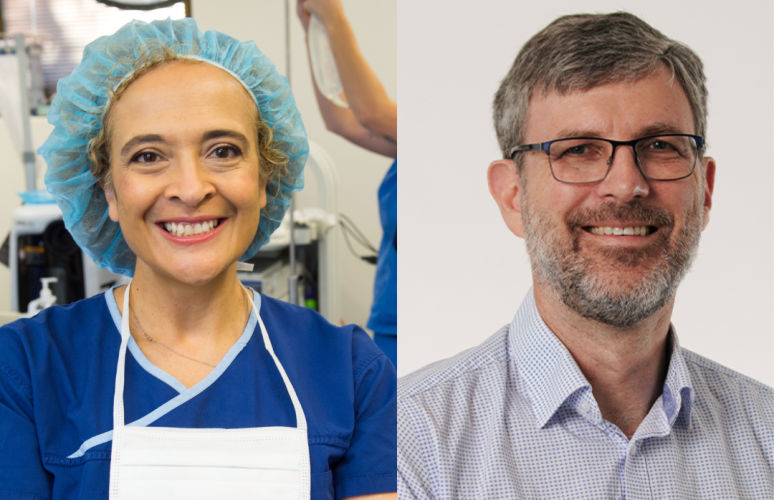South Australian doctors recognised in Australia Day Honours
AMA SA is celebrating two South Australian members who were recognised in the Australia Day Honours List.

AMA SA President Dr John Williams has congratulated two South Australian members who were recognised in the 2025 Australia Day Honours list for their crucial role in advancing the health and wellbeing of the community.
Professor Stephen McDonald was made a Member of the Order of Australia for his significant service to kidney medicine as an administrator, researcher and clinician.
Dr Samantha Pillay received a Medal of the Order of Australia for services to urology.
AMA SA President Dr John Williams says Prof McDonald and Dr Pillay are very worthy recipients.
‘Both these doctors have made an outstanding contribution to the medical profession in our state and across the country,’ Dr Williams says.
‘Their inclusion in the Australia Day Honours list is a testament to the vital role they’ve played in delivering better healthcare for patients.’
Professor Stephen McDonald (AM)
Prof McDonald wears many hats. He’s the Director of the recently formed Adelaide EpiCentre (a collaboration of the University of Adelaide Medical School, CALHN and SAHMRI) and a Senior Staff Nephrologist at The Central Northern Renal and Transplantation Service based at the Royal Adelaide Hospital. He’s also the Clinical Lead of Renal Services for the Rural Support Service of SA Health.
Over the past two decades, he’s played a pivotal role in developing the Australian New Zealand Dialysis and Transplant (ANZDATA) Registry. This clinical quality registry collects and produces a wide range of statistics relating to the outcomes of treatment of those with end-stage kidney failure.
Prof McDonald says findings from the ANZDATA Registry led to the creation of the National Indigenous Kidney Transplant Task Force and have helped improve access to dialysis and kidney transplantation in remote areas.
‘One of the things we've tried to do is make sure that the data is interpreted properly and that, where needed, action can be taken,’ Prof McDonald says.
‘There’s still a long way to go, but the provision of dialysis facilities outside of major capital cities is substantially improved across Australia compared to 20 years ago.’
Prof McDonald says being named a Member of the Order of Australia was very unexpected.
For him, the bigger reward is the knowledge that his work has helped break down geographical and socioeconomic barriers to care.
‘One of the things that has always attracted me about the world of nephrology or kidney medicine is that it very much involves long term contact with patients,’ he says.
‘I've been lucky to have ongoing interactions with my patients – both the ups and the downs – across all the “shades of life”.
‘An honour like this is very much recognition of the team I have around me and I’ve certainly been blessed in that regard.’
Dr Samantha Pillay (OAM)
Dr Samantha Pillay was the first woman to complete surgical training in Adult Urology in South Australia.
She offers specialised services to improve incontinence treatment for men and women and has launched an awareness campaign to break down the stigma around the condition.
‘For whatever reason, we know 60% of people who suffer with incontinence don't speak to their doctor,’ Dr Pillay says.
‘It's a quality-of-life issue. A lot of people really struggle to acknowledge the impact their incontinence has on their lives and what they're giving up regarding their relationships, travel, the clothes they wear, where they live, what job they do.’
Dr Pillay has developed an online course for health professionals and medical students about the treatment of incontinence. She’s also come up with novel ways to combat stigma, including a short film which is free to watch on her website and music tracks which are available on Spotify.
‘It really is a grassroots movement using any modality I can, to get people recognising the impact that incontinence has on their lives,' she says.
‘Ending that stigma and embarrassment can motivate people to seek what can be life-changing treatment.’
Dr Pillay is also working to break down gender stereotypes which hold back girls and women in STEM. She’s written ten children’s picture books in her Inspirational Careers for Kids series and released a music track designed to promote the work of women in medicine.
‘As the first female to do surgical training in Adult Urology in South Australia, there were a lot of barriers that I had to overcome. I was also a single mum while working as a consultant,’ she says.
‘By overcoming those challenges, it gives you the inspiration to want to make the journey easier for other people.
‘I've done more than I ever thought that I'd be able to achieve, and by highlighting that pathway, hopefully it gives other people the strength and vision to follow their dreams and not be held back by stereotypes.’